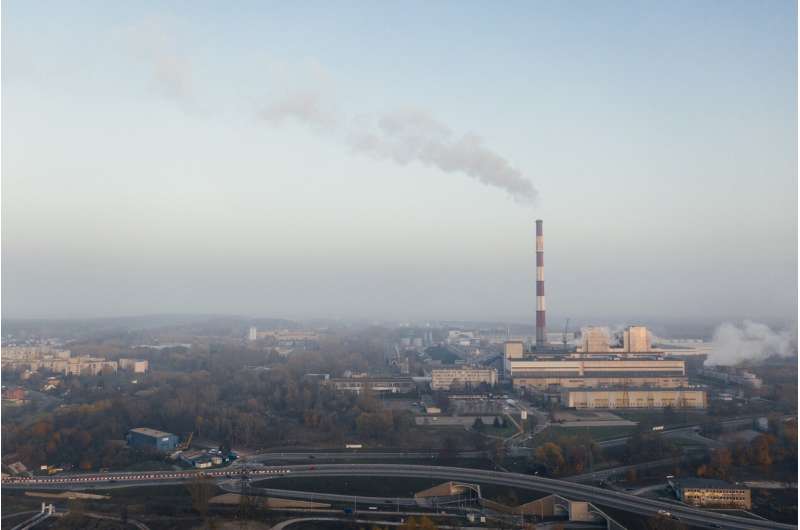This article has been reviewed according to Science X's editorial process and policies. Editors have highlighted the following attributes while ensuring the content's credibility:
fact-checked
trusted source
written by researcher(s)
proofread
A net-zero world will be more peaceful, it's assumed—but first we have to get there

The final text of the latest UN climate summit COP28, now called the UAE consensus, called for countries to "transition away from fossil fuels in energy systems, in a just, orderly and equitable manner, accelerating action in this critical decade, so as to achieve net zero by 2050 in keeping with the science."
Many felt that this "consensus" was more of a compromise, forced by the fossil fuel industry in the face of an ever more evident climate crisis.
Meteorologists have confirmed that 2023 was the hottest year on record and with the added influence of El Niño, the warm phase of a natural cycle in Earth's climate, 2024 could be humanity's first year in which warming exceeds 1.5°C above the pre-industrial average—the target of the 2015 Paris agreement.
2024 is already proving volatile for other reasons. There are wars in Ukraine and Gaza, the latter threatening a wider escalation of conflict in the Middle East, with civil war in nearby Sudan and Ethiopia. In Asia, the election of a pro-independence president in Taiwan threatens to heighten tensions with mainland China. And then there is the prospect of a second Trump presidency in the US.
This is just the beginning of a year that will see more than half the world's population go to the polls in one form or another.
In Europe, including the UK, climate action and net zero have become election issues with right-of-center parties attempting to court voters by promising to renege on national climate commitments .
Meanwhile, investment in green energy continues to accelerate in those countries that can afford it. By 2030, scientists say global emissions need to have fallen by 43%.
In six years, will we look back at 2024 as a key inflection point when the world did start to phase out fossil fuels? Or will it be seen as yet another opportunity missed?
A significant omission
In a recent study, the International Energy Agency (IEA) identified the triple challenges of "energy security, climate change and rising geopolitical risks."
It is unusual for the IEA, which began as an OECD institution to manage energy supply after the 1970s oil crisis, to highlight "geopolitics." Although it has warned of a "disorderly transition" before, its 250-page report on the world's energy outlook in late 2023 only mentioned geopolitics four times.
This is a wider problem within energy research. A recent analysis revealed that most pathways to net zero emissions do not consider what influence international relations will play. Those that do, see it as a malign influence that reduces cooperation and increases the costs of technology.
In 2019, the IEA's sister organization, the International Renewable Energy Agency, published a report which argued that, in a low-carbon future, energy security would not be the challenge it is today because most countries will generate renewable power at home and be less reliant on exporter countries.
A world powered by renewable energy may not be as prone to international competition as ours. But the challenge is getting there from our fossil-fueled system, riven with insecurity and a tinderbox of geopolitical conflict.
Unless managed, the transformation of energy systems is unlikely to be just, orderly or equitable—and this will slow the rate of decarbonization even as science indicates it must rapidly accelerate.
Managing the mess
It's useful to think about the transformation of an energy system in three phases. Phase one is the present system, phase three is where we want to end up. Phase two, the transition, is the hard bit.
In phase one, the world operates an energy system dominated by fossil fuels supplied by a relatively small number of exporter states that can manipulate fears over secure and affordable supplies in other countries.
In phase three, a net-zero world powered by low-carbon energy, fossil fuels play a marginal role if any and so will not influence international relations to the same extent.
The present energy crisis, with its record heating and electricity bills, is a crisis borne of a system powered by coal, oil and gas. For some, such as the EU, it is a clarion call to accelerate the transition and improve energy efficiency to reduce reliance on these fuels. For others, such as the Gulf states, the answer lies in pumping more oil and gas.
The world is entering phase two, the messy stage in which the world endeavors to phase out fossil fuels while building an energy system powered by solar, wind and other renewable sources in a fair and orderly way—but at a sufficient pace to rapidly decarbonize society.
This low-carbon transition is also a source of competition. Access to critical materials for making electric vehicles and other green technologies, and control of these supply chains, is becoming a key issue, with a form of "green protectionsim" emerging in some countries. For many emerging economies, access to energy of any kind is the most pressing challenge.
While all of this is happening, the world must contend with the effects of climate change accelerating—bigger floods, fires and droughts.
Will self-interest win out, frustrating progress towards a net-zero future? Or will we strengthen and make accountable multilateral institutions, recognizing that there are no winners in a rapidly warming world?
The future is likely to be somewhere in the middle. For now, events in 2024 will go a long way to determine where we find ourselves in 2030.
Provided by The Conversation
This article is republished from The Conversation under a Creative Commons license. Read the original article.![]()





















